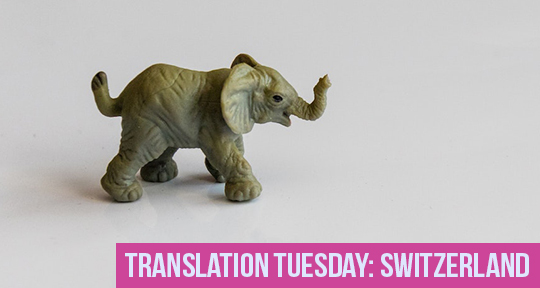This Translation Tuesday, we are privy to Swiss writer Gianna Rovere’s intimate musings on her encounters with elephants in a year— from overheard conversations on the train to a trip to Ikea. In direct prose, deftly translated from the German by Regan Mies, Rovere imbues her daily life with whimsy through the simple act of noticing in “Incidents of Everyday Elephants.”
November 12, 2020: Toys
I’ve always thought elephants made sense on children’s products and as toys because they have such a practical shape for small hands: a slender trunk for a child’s tight grip; an arched spine to be stroked; and four sturdy legs that stand solid and firm. Lovely, round shapes. I recently met a friend again for the first time in a while, and we got to talking about it all. Toys, elephants. He had cancer. Chemotherapy, hair all fallen out, weighed a hundred kilograms. He’d just become infertile. My friend’s doctor gave him a special offer, so now his sperm’s waiting for his cue from a nitrogen tank in Bern, in case the infertility stays. And what have I been doing? Looking for elephants in everyday life. Do you know, then, why they’re so often pictured on kids’ products? my friend asked. He said, My father’s worked in marketing for quite some time now and told me once, during a visit to the zoo, that elephants have positive connotations all over the world. So that’s why. Sure, dogs might be cute here, but in Asia, they’re dirty.
February 4, 2021: Relocation
I’m transporting an Ikea bag brimming with elephants. I’ve strapped it down onto two moving boxes, each of which I’ve tied tightly to a bike trailer. Forty-six elephants; small and large, made of porcelain, wood, or wax. I pull the trailer unhurriedly behind me. Halfway across the crosswalk at Albisriederplatz, I get a call. I hold the phone between my cheek and shoulder, and the elephants tip slowly left. At the last second, I catch their fall with my free hand. A car honks. Apologetic, I raise my hand, and the elephants spill down onto the asphalt. It sounds like broken glass.
February 23, 2021: New Message
Today, I was once again offered an elephant via telegram. A saltshaker.
February 28, 2021: Level
On the train to Luzern, a well-dressed man asks his son, who’s playing on a tablet:
“So’ve you managed to do it yet, with the little elephant like that?” READ MORE…


